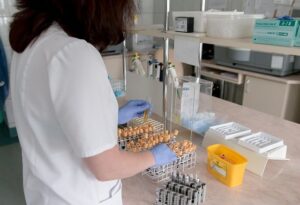Stem Cell Weekly News: FDA Approves First TCR Cell Therapy
- What are the WHO recommendations for Japanese encephalitis vaccines?
- Individuals Carrying Two APOE4 Copies Likely to Develop Alzheimer’s Disease Symptoms
- What Is The Role of Lactic Acid in Tumor Growth and Therapy Resistance?
- The Enigma of Beethoven’s Deafness: Unveiling the Role of Lead Poisoning
- World First Autologous Regenerated Islet Transplantation Successful
- FDA Approved Opdualag: The First Immunotherapy Targeting LAG-3
Stem Cell Weekly News: FDA Approves First TCR Cell Therapy
- AstraZeneca Admits for the First Time that its COVID Vaccine Has Blood Clot Side Effects
- Was COVID virus leaked from the Chinese WIV lab?
- HIV Cure Research: New Study Links Viral DNA Levels to Spontaneous Control
- FDA has mandated a top-level black box warning for all marketed CAR-T therapies
- Can people with high blood pressure eat peanuts?
- What is the difference between dopamine and dobutamine?
- How long can the patient live after heart stent surgery?
Stem Cell Weekly News: FDA Approves First TCR Cell Therapy.
FDA Approves First TCR Cell Therapy:
Biotech company Immunocore announced that the U.S. Food and Drug Administration (FDA) has approved its innovative therapy Kimmtrak (tebentafusp-tebn) for the treatment of specific uveal melanoma.
It is the first FDA-approved treatment for unresectable or metastatic uveal melanoma.
It is also the first T-cell receptor (TCR) therapy to receive regulatory approval, and the first FDA-approved bispecific T-cell linker to treat solid tumors.

Bayer Parkinson’s Cell Therapy Phase I Clinical Treatment of the First Patient:
Bayer announced that it has partnered with University Health Network (UHN) to evaluate the open-label Phase 1 of DA01 in patients with advanced Parkinson’s disease (PD) The first patient was dosed in the study (Ph1).
DA01, a pluripotent stem cell-derived dopaminergic neuron, is a first-of-its-kind cell therapy with the potential to regenerate lost function and potentially improve and reverse Parkinson’s disease.
Currently, DA01 is being clinically evaluated in a subset of patients with advanced Parkinson’s disease who are no longer fully effective with conventional drug therapy.
U.S. FDA grants fast-track designation to placenta-derived NK therapy CYNK-101:
The U.S. Food and Drug Administration (FDA) has granted genetically modified cryopreserved human placental hematopoietic stem cells-derived natural killer (NK) cell therapy CYNK-101 Fast track designation (FTD ): first-line therapy for patients with advanced HER2/neu-positive gastric or gastroesophageal junction (G/GEJ) adenocarcinoma.
CYNK-101 is an allogeneic, ready-to-use, human placental CD34+ cell-derived NK cell product genetically modified to express a high-affinity and cleavage-resistant CD16 (FCGRIIIA) variant to drive antibody-dependent cell-mediated toxicity.
Stem cells and robots help blind patients improve vision:
The international media CGTN reported on the use of robots to implant stem cells in patients’ eyes to repair vision loss.
Scientists at King’s College London and Moorfields Eye Hospital are working on a new technique for implanting stem cells into the back of the eye to restore vision.
The trial has now been successfully tested on two patients who were previously unable to read at all, but who, after treatment, can now read with regular reading glasses at 60 to 80 words per minute.
Stem cell discovery has potential to improve cancer treatment:
Researchers have identified a protein, syndecan-2, expressed by blood stem cells, that could help identify, study and deploy for treatment, according to a study published in the journal Blood Cell.
This protein can recognize primitive blood stem cells and regulate stem cell function, playing an important role in the reproduction of hematopoietic stem cells.
By transplanting only cells that express syndecan-2, it may be possible to make blood stem cell transplants more effective and less toxic.
Immune cell therapy for autoimmune diseases attracts capital attention:
Kyverna Therapeutics announced the completion of an $85 million Series B financing.
The funds obtained from this round of financing will be used to support the initiation of a Phase 2 clinical trial of KYV-101, a CAR-T cell therapy for the treatment of autoimmune diseases, in the first half of this year, and to expand its engineered cell therapy pipeline.
KYV-101 is a clinical-stage, CD19-targeting CAR-T cell therapy with properties particularly suited for the treatment of B cell-driven autoimmune diseases such as lupus nephritis, systemic sclerosis, and inflammatory myopathy.
Stem Cell Weekly News: FDA Approves First TCR Cell Therapy
(sourceinternet, reference only)
Disclaimer of medicaltrend.org
Important Note: The information provided is for informational purposes only and should not be considered as medical advice.



